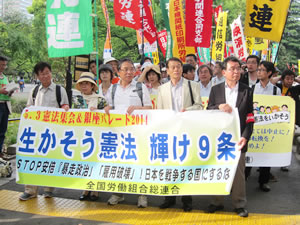Zenroren criticizes prime minister’s advisory panel for calling for Japan to be turned into a country that can go to war
May 15, 2014
Statement by
ODAGAWA Yoshikazu
Secretary General
National Confederation of Trade Unions (Zenroren)
 The “Advisory Panel on Reconstruction of the Legal Basis for Security” to Prime Minister ABE Shinzo on May 15 came up with a report. The “Advisory Panel on Reconstruction of the Legal Basis for Security” to Prime Minister ABE Shinzo on May 15 came up with a report.
Prime Minister Abe said his policy direction of changing the government’s constitutional interpretation to allow the country to exercise the right of collective self-defense has been supported by the “report.”
In its present interpretation of the Constitution, the government has claimed that Japan is allowed to use force in self-defense but that the country is supposed to refrain from invoking the right of collective self-defense in the event of Japan’s ally being attacked or from participating in UN-led collective security measures that involve the use of force.
The present Japanese Constitution does not allow the country to use force, which might kill people of other countries in their territory, land or waters, and drive Japanese people into war to face the gunpoint.
Ignoring these important constitutional restrictions, the “report” and the “basic directions” were published by the panel without giving the people opportunities of discussion.
In the constituent assembly more than 60 years ago, the phrase “Aspiring sincerely to an international peace based on justice and order” was added to the first paragraph of Article 9 of the Constitution (*).
This historical fact shows that the government is asked to have dialogue and make diplomatic efforts to contribute to maintaining the international peace. In other words, even if the security situation relating to Japan has changed, the Constitution, which represents the will of the people, in principle rejects the use of force in settling international disputes.
This being the will of the Japanese people, it is contrary to constitutionalism for the Abe administration alone to change and even abandon the constitutional interpretation that was established as the basic principle of running the country. If such a method is approved, the Constitution will lose its raison d’etre as the basic law of the nation and could even destroy the prerequisite for Japan’s existence as a nation ruled by law.
Prime Minister Abe has asked the ruling coalition to examine the basic directions set out by the “report.”
The ruling coalition says that it will examine the recommendations based on what might be supposed to be limited cases of exercising the right of collective self-defense and that it will begin by looking into so-called “grey zone examples” concerning the Self-Defense Forces’ response to illegal acts by armed groups of other countries in Japanese territorial waters or remote islands.
How tricky it is to try to pave the way for the use of collective-self-defense by expanding areas of operation of the Self-Defense Forces to include cases that could be dealt with by invoking the right of the individual self-defense or by police authority!
The advisory panel’s composition and discussions show that it had already a clear conclusion before completing the process and tried to manipulate public opinion. This is the last method to be used for discussing such a crucial issue. Given that the government has so far argued that Japan is not allowed to exercise the right of collective self-defense, it must call for a nationwide discussion after carefully explaining this to the public and propounding what it believes is possible regarding its proposal to change the interpretation of the Constitution. The Abe administration has not fulfilled the minimum responsibility to do this.
The Abe administration’s senseless rush to the adverse reinterpretation of the Constitution is deepening a sense of crisis and giving rise to opposition among not only those who wish to let the Constitution guide and those who oppose Japan’s participation in all sorts of war but also among those who believe it necessary to change the text of the Constitution if Japan is to be allowed to exercise the right of collective self-defense. In various opinion surveys opposition to allowing the country to exercise the right of collective self-defense is the majority opinion.
At a time when the Constitution is facing the deepest crisis since the end of WWII, Zenroren will strive to increase the nationwide movement by joining forces with a broad spectrum of people who are against changing the interpretation of the Constitution with the aim of enabling the country to exercise the right of collective self-defense. We are now aiming to collect 5 million signatures in defense of the Constitution. We call on all union members to work together to advance the campaign.
*Paragraph one of the Constitution’s Article 9 says: “Aspiring sincerely to an international peace based on justice and order, the Japanese people forever renounce war as a sovereign right of the nation and the threat or use of force as means of settling international disputes.” |

